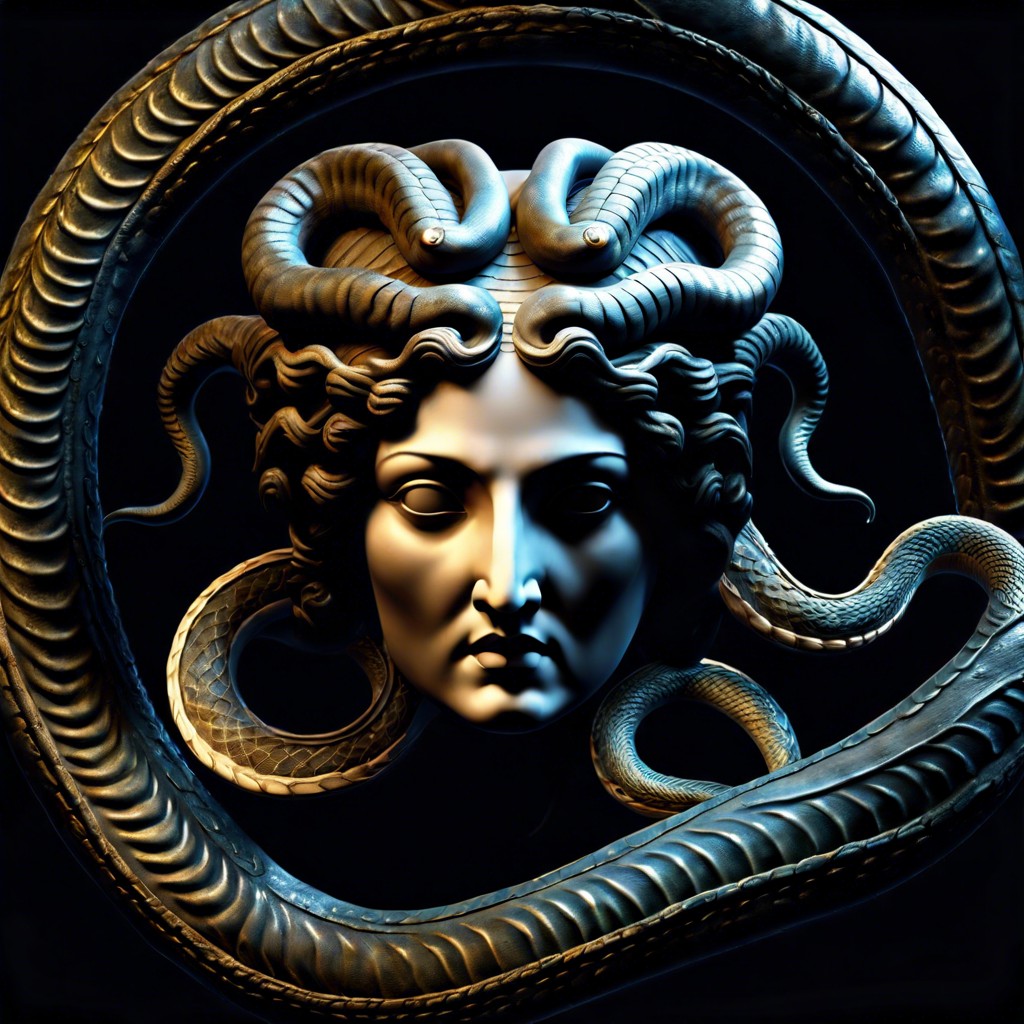Medusa embodies themes of transformation, power, and caution, symbolizing both protective energy and the complexities of female rage.
Medusa has captivated human imagination for centuries, evolving from a feared Greek monster to a potent symbol of transformation and resilience. This article unravels her mythological roots, dives into her diverse cultural interpretations, and explores her profound psychological and spiritual significance. Discover how Medusa’s story manifests in art, literature, and modern culture, offering an intriguing journey through her multifaceted legacy.
Key takeaways:
- Medusa symbolizes transformation, power, and caution.
- Her myth reflects societal attitudes and historical values.
- Represents protection and overcoming fear in cultures.
- Embodies inner turmoil, trauma, and spiritual growth.
- Modern interpretations emphasize female empowerment and resilience.
Mythological Background and Historical Origins

Medusa, one of the most iconic figures in Greek mythology, was originally one of the three Gorgon sisters. Unlike her immortal siblings, she was mortal.
She was once a beautiful maiden, but her life took a tragic turn. According to myth, she was transformed into a monster by Athena, who was enraged because Poseidon defiled her in Athena’s temple.
Her hair became venomous snakes, her gaze turned onlookers to stone. This transformation made Medusa a powerful symbol of the dangerous and the forbidden.
Her story does more than intrigue; it serves as an allegory about beauty, wrath, and the consequences of defiled sanctity. Ancient stories of Medusa reflect societal attitudes, giving us rich insight into the values and fears of past civilizations.
Symbolism and Interpretations in Various Cultures
In ancient Greece, Medusa’s visage was often seen as a symbol of protection. Her image was used on shields and amulets to ward off evil. The myth where Perseus slays her has led many to see her as a representation of overcoming fear and chaos.
In Roman culture, Medusa’s head, or Gorgoneion, was similarly protective, often placed on buildings and armor. Romans also associated her image with the goddess Athena, embodying wisdom and war strategy.
In more contemporary interpretations, Medusa has been viewed through a feminist lens. She symbolizes the vilification of women’s power and beauty, transformed into a monster by a male-dominated society.
Some modern spiritual perspectives regard Medusa as a figure of transformation and awakening, indicative of facing inner demons and emerging stronger.
Each culture brings a unique lens, shaping Medusa’s multifaceted symbolism.
Psychological and Spiritual Significance
Medusa’s psychological and spiritual significance delves into the deeper layers of the human mind and soul.
Her serpentine hair and petrifying gaze symbolize complex emotions and inner turmoil. She represents the power of the subconscious and the hidden aspects of ourselves that we often fear confronting.
Medusa’s transformation from a beautiful maiden to a monstrous figure can signify personal trauma and suffering. It’s a reminder of how pain and betrayal can change us.
Spiritually, Medusa embodies protection and transformation. Her image wards off negative energy, while her story encourages facing and overcoming inner demons.
In essence, Medusa is a multifaceted symbol of the shadows within, urging introspection and personal growth.
Representation in Art and Literature
Medusa has been a compelling figure in art and literature for centuries. Artists like Caravaggio and Rubens have depicted her dramatic, serpentine image, capturing the sheer terror and fascination she evokes. Through paintings and sculptures, Medusa’s gaze—turning onlookers to stone—symbolizes a potent mix of beauty and horror.
In literature, her story has been reinterpreted countless times. Greek tragedies, medieval poetry, and modern novels often explore her complex narrative, portraying her as both a monster and a victim. This duality allows for rich thematic exploration, including the nature of power, transformation, and redemption.
Medusa’s imagery transcends mere fear; it’s deeply symbolic. Her severed head, for example, often represents the deadly consequences of unchecked vanity and hubris. Artistic depictions frequently highlight this, utilizing her image to evoke themes of mortality and divine retribution.
Modern writers and artists continue to find relevance in Medusa’s myth, embracing her as a symbol of female rage and resilience. With every retelling, they add layers to her story, reflecting contemporary issues and personal interpretations. This dynamic evolution keeps Medusa perpetually resonant, continually shaping and reshaping her place in cultural consciousness.
Modern Cultural Impact and Relevance
Medusa’s presence in modern culture extends far beyond ancient mythology. Her image often symbolizes female empowerment, representing the strength found in embracing one’s true nature.
In fashion, Medusa has become an iconic emblem, most famously used by the luxury brand Versace. This usage underscores a link between beauty, power, and allure.
Art and media frequently revisit Medusa’s story, using it to explore themes of transformation and the consequences of vengeance. Films, books, and television shows depict her as both a fearsome monster and a misunderstood figure, compelling the audience to re-evaluate her narrative.
On social media and in contemporary discussions, Medusa is occasionally invoked as a symbol against victim-blaming, promoting conversations about consent and autonomy. Her story is reinterpreted to emphasize resilience and the defiance of oppressive forces.
The enduring fascination with Medusa reveals her ability to adapt and resonate with each era, providing a versatile symbol of many complex ideas in modern times.





